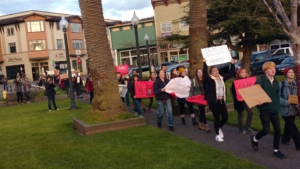In the United States a movement has emerged to remove symbols of white supremacy and colonialism. This movement has gained momentum since the events in Charlottesville, Virginia in 2017 when the forces of white supremacy rallied to protect a Confederate monument, going on a racist rampage the resulted in the assassination of anti-racist activist Heather Heyer, and the brutal beating of DeAndre Harris.
One corner of the U.S. where the movement has spread is Arcata, California, a small liberal college town within Humboldt County. In the town center stands a statue of President William McKinley. There have been numerous calls for its removal since the 1970s. Also on the Arcata Plaza lies the Jacoby Storehouse Plaque which uses the phrase “Indian troubles” to describe the relationship between colonial settlers and indigenous peoples.
The birth of U.S. imperialism
President McKinley was the 25th President of the United States of America from 1897-1901. Under his administration McKinley ushered the United States into the stage of capitalism known as imperialism by instigating the Spanish-American War and soon after the Philippine-American War.
As a consequence of these wars, United States became a colonizer outside of the continental United States acquiring possessions throughout the Caribbean and the Pacific
including Puerto Rico, Guam, Virgin Islands, Samoa and the Philippines. The majority of these areas are still under U.S. colonial occupation with a population possessing second class status suffering at the hands of capitalist exploitation and genocide, despite generations of liberation struggles.
McKinley’s legacy is ever present in the areas surrounding Arcata. The town of Manila and street of Samoa are named after territorial possessions acquired by the during McKinley’s tenure. Manila is the capital of the Philippines and Samoa is named after American Samoa, both in the Pacific. McKinleyville, a town located two miles away, was named in honor of McKinley after his assassination by Leon Czolgosz, a self-proclaimed anarchist.
History of the McKinley statue
The statue’s ties to Arcata originate with capitalist George Zehnder, originally from Arcata, who supported the genocidal campaign against the Indigenous peoples (Wiyot) of Humboldt County and led the removal of Jewish and Chinese immigrants from Humboldt county. After personally meeting President McKinley, Zehnder commissioned an artist to build a bronze statue of McKinley with his right hand outstretched and the other holding the Annexation Treaty for Hawaii. The statue was installed in May 1906 and stood in San Francisco until the San Francisco earthquake which toppled it over. After the earthquake the statue was moved to Arcata Plaza, facing westward, where it has stood for over 100 years. Today it is one of three McKinley statues located in California, the other two in San Francisco and San Jose, with several others located throughout the United States.
The McKinley statue has faced numerous calls for removal since the 1970s . Those calls for removal have been met with swift opposition among other obstacles, most of which were bureaucratic. However the latest call for removal has gained more momentum. The current movement is organized under the banner of the Historic Justice Alliance, with both Seventh Generation Fund and Mecha de Humboldt State serving as the vanguards of the movement. Seventh Generation Fund, a local community organization centered on the liberation of the local Native American community, launched a petition in September 2017 calling for the removal of the McKinley Statue and the Jacoby Storehouse Plaque with the goal of 1200 signatures and were soon joined by Mecha de Humboldt State University. Together both organizations organized the Arcatan community to demand the removal of the McKinley statue by collecting over 1300 signatures and presenting the petition at the October 18, 2o17 Arcata City Council meeting, demanding both symbols of oppression be removed.
After the pressure was put on, City Council decided to host a study session on December 4, 2017 about the McKinley statue where the Historic Justice Alliance and other organizations put further pressure to place the issue on the Feb 21 City Council agenda. Prior to the study session the movement to remove the McKinley statue gained national momentum when the Historic Justice Alliance allied with people in Hawaii currently organizing to remove a McKinley Statue located on indigenous Hawaiian territory.
A historic decision
At the February 21 Arcata City Council meeting, a great victory was achieved when Arcata City Council voted to remove both the McKinley statue and Jacoby
Storehouse Plaque. Prior to the Arcata City Council meeting, Mecha organized a march starting at Humboldt State University at Arcata Plaza where local Indigenous activists rallied in support of the removal of the statue. The crowd of supporters then marched to Arcata City Council, led by organizers from Humboldt State Mecha chanting “Hey hey, ho ho, the McKinley statue’s got to go!” until they filled Arcata City Hall chambers moments
prior to the meeting.
Through several painstaking hours Seventh Generation Fund and members of the community provided testimonies and historical information pushing for the removal of
the McKinley statue and Jacoby Storehouse Plaque. After hearing the testimony from the community, the Arcata City Council decided to vote in favor of removing the McKinley Statue (4:1) and the Jacoby Storehouse Plaque (5:0) a historic decision for the City of Arcata and Humboldt County. However prior to removing the McKinley statue the city has to amend the General Plan to perform an Environmental Impact Report which will cost about $65,000.
While the date of removal is yet to be decided, the decision to remove these symbols of oppression led to cheers of celebration among the crowd of supporters. Overall this victory brings inspiration to local activists and organizers and shows what can be achieved by in similar struggles nationwide.







